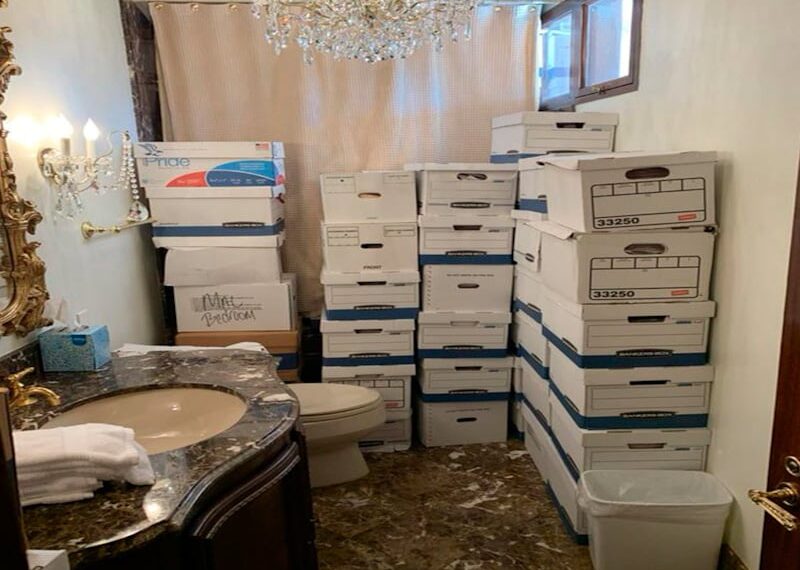[ad_1]
Criminal Justice
How Rule 29 motion could save Trump in classified documents case; what are other possibilities?

This image, contained in the indictment against former President Donald Trump, shows boxes of records stored in a bathroom and shower at Trump’s Mar-a-Lago estate in Palm Beach, Florida. Photo by the U.S. Department of Justice via the Associated Press. Adjacent image from the Department of Justice.
Lawyers for former President Donald Trump could obtain an unappealable victory in the classified documents case if a motion for a directed verdict of acquittal is granted during the right stage of the criminal trial.
Above the Law and the Atlantic looked at the possibility following the unsealing of the 38-count indictment Friday.
A motion under Rule 29 of the Federal Rules of Criminal Procedure, according to the Atlantic, authorizes a federal judge to dismiss a criminal case after the prosecution presents evidence, if the judge finds that the evidence was insufficient to find guilt beyond a reasonable doubt.
“For reasons of double jeopardy, if a judge dismisses a case at the close of the prosecutor’s presentation, that’s the end of it,” the Atlantic reports.
But a Rule 29 dismissal after a jury’s guilty verdict could be appealed, according to advisory committee notes to Rule 29 and Above the Law, which cited a tweet by Orin Kerr, a professor at the University of California at Berkeley School of Law.
The charges against Trump are willful retention of national defense information in violation of the Espionage Act, withholding or concealing documents in a federal investigation, false statements and conspiracy to obstruct justice.
Trump is charged in 37 of the 38 indictment counts, while his valet and aide Waltine Nauta is named in six counts, according to the Washington Post. Nauta is not named in the Espionage Act counts.
U.S. District Judge Aileen Cannon of the Southern District of Florida was randomly assigned to the case initially, according to the chief court clerk for the Southern District of Florida, the New York Times reports.
Cannon is a federal judge who appointed a special master to review documents seized from Trump before a federal appeals court ruled that she didn’t have jurisdiction in the case.
The Atlantic article was written by Paul Rosenzweig, former deputy assistant secretary for policy at the U.S. Department of Homeland Security and a cybersecurity professor at the George Washington University Law School. He said he has no reason to think that Cannon would use Rule 29 “in an inappropriate manner.”
Above the Law author Joe Patrice, who’s also a senior editor, also thinks that it unlikely, predicting instead that Cannon “will take this opportunity to flee the case before it becomes the scarlet T on her career.” Cannon is a Trump appointee.
But if Cannon stays in the case, there are other ways that she can influence the outcome short of a Rule 29 ruling, according to the Atlantic.
One issue is whether Cannon will allow Trump to present defenses that “border on frivolous.” One is the “I can declassify a document just by thinking about it” defense. The other is the assertion that “I’m entitled to keep whatever documents I want from my presidency.”
Another possibility is that Cannon will set a trial date after the 2024 presidential election. If Trump or another Republican wins, “there is every reason” to think that the winner would order the case against Trump to be dismissed, according to the Atlantic.
Yet another possibility is a hung jury if an “adamant pro-Trump supporter” is seated.
Slate summed up the possible prosecution hurdles this way: “Cannon can try to rig voir dire to help the defense stack the jury with Trump supporters. She can exclude evidence and testimony that’s especially damning to Trump. She can disqualify witnesses who are favorable to the prosecution. She can sustain the defense’s frivolous objections and overrule the prosecution’s meritorious ones. She can direct a verdict of acquittal to render the jury superfluous. She can declare a mistrial prematurely for any number of reasons, including lengthy juror deliberations, and stretch out various deadlines to run out the clock. Many of these procedural moves could not be appealed until the proceedings have drawn to a close; appeals courts do not referee every little dispute in a jury trial as they happen. Cannon will be in control.”
Rosenzweig thinks that the problems for prosecutors are not insurmountable but says they “are far more formidable than many observers think.”
“There is a more-than-reasonable possibility that Trump will never be convicted of the crimes with which he has been charged,” he wrote in the Atlantic.
See also:
ABAJournal.com: “Will Trump be indicted in Mar-a-Lago documents case? His lawyers see possibility, object to special master request”
ABAJournal.com: “Who filed phony document in Trump Mar-a-Lago search case?”
ABAJournal.com: “Meet Raymond Dearie, the judge picked to oversee Mar-a-Lago documents review”
ABAJournal.com: “Trump requests special master for review of documents seized by FBI”
ABAJournal.com: “Could Trump be banned from office if he’s convicted of taking government documents?”
ABAJournal.com: “DOJ files motion to unseal warrant, property receipt relating to search of Trump’s home”
ABAJournal.com: “Judge who signed Trump search warrant is targeted; critics seek ‘judgment of God’”
ABAJournal.com: “Trump search-warrant affidavit, released on judge’s orders, cites sensitive documents, possible obstruction”
[ad_2]




